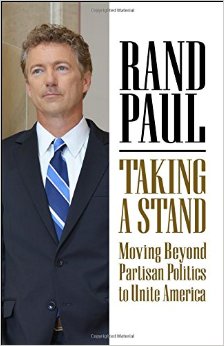 The first edition | |
| Author | Rand Paul |
|---|---|
| Language | English |
| Genre | Politics |
| Publisher | Center Street |
Publication date | May 26, 2015 |
| Publication place | United States |
| Media type | Hardcover |
| Pages | 320 |
| ISBN | 978-1-4555-4956-6 |
| ||
|---|---|---|
U.S. Senator from Kentucky | ||
Taking a Stand: Moving Beyond Partisan Politics to Unite America is a book by U.S. Senator Rand Paul of Kentucky. The book was released on May 26, 2015, by Center Street, a main publishing division of Hachette Book Group. It happened to coincide with Paul's filibuster in the United States Senate of the PATRIOT Act provisions which were expected to expire at midnight on June 1, 2015. [1]
Contents
Paul had previously engaged in a filibuster of the nomination of John O. Brennan as director of the Central Intelligence Agency in 2013, which led to his campaign team coining the phrase "Stand With Rand." [2]
